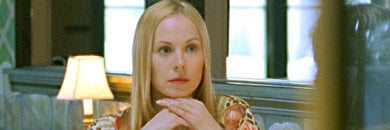Forty Shades of Blue (15)
The melancholy mood of Forty Shades of Blue seems to have been channelled directly from a land of lost horizons and broken hearts, otherwise known as the 1970s.

Ira Sachs's chamber piece, a winner of the Grand Jury Prize at the Sundance festival, is actually set in the present, but its shrugging, understated style will put you in mind of early Robert Altman: it could very easily be a pendant to his country and western fresco Nashville (1975), and the louring presence of Rip Torn at the centre only amplifies that anachronistic vibe. So Sachs wins good marks for taste straight off the bat.
We are not in Nashville, however, but Memphis, where legendary R&B impresario Alan James (Torn) made his name as a white man producing black soul records back in the old days. Bearded and burly, he's now past his best (he looks like a slimmed-down Pavarotti), but still lives for the camaraderie of the music scene, at the expense of neglecting the much younger Russian girlfriend Laura (Dina Korzun) he brought back from a tour in Moscow. Laura, almost catatonically glazed in the early scenes, would in a more traditional movie play second fiddle to the legend, but here becomes as significant a character as James. "She's a nice lady," he says, as if referring to a distant business associate - which, for all the time James devotes to her, she might as well be.
Sachs traces the dynamic of their relationship in such a casual, sidelong way you wonder if he knows exactly where his film's going. His camera spends a lot of the time just staring. While James sneaks away from an industry party for an after-hours bunk-up, Laura drifts around the party alone and fights off the advances of some chancer who escorts her home. It might be that she is cowed by her famous husband, who alternates between teddy bear and grizzly bear according to his mood. Or has she resigned herself, in a fatalistic Russian way, to his negligence?
The situation is complicated by the arrival of James's semi-estranged son Michael (Darren E Burrows), whose resentment of his father is only sharpened by the surprise of finding him ensconced with a hot new girlfriend. Once his hostility blurs into sympathy we sit tight and wait for the son to cuckold his father. If the film were a comedy - music producer's son sleeps with his dad's consort - it might be entitled Oedipus Rocks. But it isn't a comedy; in fact, you'd be hard put to find a single laugh here, despite Torn's aggressive joviality (James is the kind of man who likes to endear himself to an audience by telling them they look like shit).
At times the level of familial anguish put us less in mind of Altman than Bergman, and somewhere in the distance we sense an almighty stormcloud about to burst. It is a sorrowful irony that James, having ignored his loved ones for most of his life, chooses at this late hour to become observant. As Laura, Korzun (who starred in Pavel Pawlikowski's Last Resort) sidles her way into the film, then by degrees takes it over (and if that was her singing the title song then a) she has a good, Joni Mitchell-ish voice and b) why did the director not make more of it?).
Music, or rather the desultory use of it, is one of the film's unexpected problems. Given the big after-dinner speech James makes at the start about what music has meant to him, and given that he's surrounded the whole time by musicians, the film seems curiously reluctant to let songs answer the mood. This is Memphis, after all, where blues and soul gave the world a raw language of heartache and loss. True, there's a blast of the Dan Penn/Chips Moman classic "Dark End of the Street", neatly foreshadowing the illicit love affair that will dominate the story, but thereafter the soundtrack survives on bits and pieces, much of it overheard in studio booths where James acts the irascible old goat. The film establishes such an emotional reticence between characters that it all but cries out for music as a release valve. The irregular introduction of it here feels like a lost opportunity.
Sachs evidently aims for the same kind of understatement in the script he co-wrote with Michael Rohatyn, preferring to observe minute changes in the emotional climate rather than to do anything as vulgar as up the tempo. This approach is fine so long as there is absolute confidence in the actors: one thinks of Sofia Coppola entrusting the mood of disappointment and longing in Lost in Translation to Bill Murray and Scarlett Johansson, where it didn't matter that not much was actually happening. In this movie, however, Burrows, in the pivotal role of Michael, is so closed off that, at times, his character barely registers, and his big moment - a speech at a party honouring his dad - falls flat because Sachs seems to have allowed him to improvise instead of writing a proper speech. His stumbling, off-the-cuff address might be "realistic", but we don't watch movies for a reproduction of life, we watch them for a magical intensification of it.
Forty Shades of Blue is worth seeing for the slow burn of Korzun's performance, and for the majestic Torn, playing the kind of showbiz egomaniac beloved of everyone except his family ("not one of my wives could make gravy, even out of a can!" he yells at one point). But in tamping down the volume at which family strife usually occurs Sachs has gone too far into repression and produced something slightly poky and muffled. It tugs at the heartstrings now and then, but there's not much of a tune being played.
Join our commenting forum
Join thought-provoking conversations, follow other Independent readers and see their replies
Comments